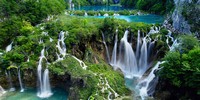CROATIAN FOLK SONGS
Our folk songs, our circle-come-wheel dances (kolo), row dances (tanac) and pair dances (ples), endure in the sound and movement of the people, mostly as a need, as an awareness of the past, as an elucidation of identity. That is why these folk, even in the harshest times of their history, reached for song and dance in all their forms, for their gusle (one-string fiddle), their lijerica (a three-string instrument), their tambouras and mandolins, their diple (twin-reed shepherd's flute) and their double flutes (dvojnice), their flutes and sopile (Istrian long flute). And this not to alleviate and eliminate their pain but rather to turn it into song, to perpetuate the centuries-old record of trials, tribulations and suffering so as to add to the collective consciousness the unclouded sources of pain, the paths of those sufferings and cures for such sufferers. The people of those times, practically illiterate, perceived Nature in its original form, without a mediator, which is why it obtained a personal transfer its fullness without losing the smallest modicum of it to a mediator.
(...) The people do not take into consideration that somebody could be listening to them. We are, therefore, faced with the fact whereby a poet and a singer are the creator, performer and listener. In a circle dance we also have three elements: poetry, singing and mimicry, again combined in a single person. (A. Dobronić).
Popular melodies, creations by anonymous poets and inventors of chants, of dancers and intuitive conceivers - issuing directly from the life of people, out of living practice, the daily way of life -become the property of a string of generations, of their historical and folklore epoch; and from it there issued the very Being of chants handed down through the voices and steps of one generation to the new inheritors of those chanted facts of spiritual quality. He, who did not pay true attention to the graves of his forefathers, paid no attention to the cradles of his descendants either. The works of the folk of any people, and therefore of the Croatian people too, are the measure of its identity, the measure of harmony with its very self. Peoples win their freedom through rebellions and revolutions; they defend their integrity by watch-towers on their borders, but that which has been liberated and defended is retained only through the preserved heritage of the folkloric creative power of generation after generation, in works both written and unwritten by people - individuals and groups alike. A country can be ruled, but one can only avail oneself of the works produced by its people, and be in turn rewarded by that use. That which has ever been beautiful - the endlessly patient deeds of countless generations, inventions beyond description left by those generations, a spiritual craving stronger than mere hunger for wheat, the greed for gold, which ensured that this inheritance is not turned into wheat or transformed into gold, has ever been beautiful, to remain an untarnished treasure in the primeval spiritual chest of this people.
Songs extol justice and love, indeed a love for justice and fairness in whatever kind of love, even when brutal pogroms were sweeping over the roofs and cradles of this people, even then did not the urge for revenge grow, but rather a yearning for justice.
They do, however, bear a powerful influence on the soul of its listeners, who gradually learn them by heart; on occasions I saw a man weeping and pining for a girl. And the folk sing, particularly in the night, of deeds of old performed by Slavic noblemen and kings, or of some tragic events. Should it so happen that a traveller from the neighbouring hill comes along, he'll be repeating the verse that first one had sung, and this alternating singing continues until the distance between them does not separate those two voices. (A. Fortis). Small peoples are often small first in the fish pond of larger ones - but nature has endowed those small fish with tiny bones, and there can be no morsel supped by the bigger one without some tiny bone of the smaller being stuck in their throat, and that to this very day, hoarsening their voices even when they are not singing. The intelligentsia writes for intelligentsia, while ordinary folk write for the people and for the intelligentsia alike, even for an intelligentsia that is eventually going to write for the people. People write about things that have not been said, or sung or danced; they do not copy from wise books. When people create, they are motivated by one thing alone: the life and vitality of that same people, the historical current which at that particular point in time is turning the waterwheel in order to uphold the heritage trust of that sacred meal. That is why the home of song and movement lies in the heart of a People, and those folklore and artistic creations are the paths which criss-cross the land of the people, and it is along those paths that people walk, their differences and diversities are the crossroads of those paths, while morals and ethics are the signposts on those crossings. And so do customs become traditions, traditions become a culture, and culture becomes spirituality.




 0038523394636
0038523394636



